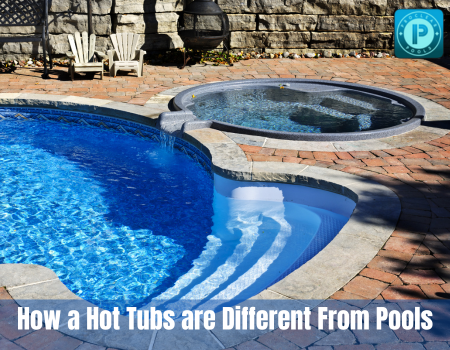Hot tubs and pools are both popular features for enhancing backyard relaxation and enjoyment, but they serve different purposes and offer distinct experiences. While they share some similarities, such as providing water-based recreation and relaxation, there are several key differences between them in terms of size, temperature, maintenance, and overall function.
Main Differences Between Hot Tubs and Pools
 Temperature
Temperature
The most obvious and significant difference between a hot tub and a pool is the water temperature.
- Hot Tub: Hot tubs are designed to be used with heated water, typically ranging from 100°F to 104°F (37°C to 40°C). The warm water and the soothing jets are primarily intended for relaxation, muscle relief, and therapeutic purposes. Soaking in a hot tub is a calming experience that encourages stress relief and is often used for its health benefits, such as improving circulation and easing muscle tension.
- Pool: Pools, on the other hand, are designed for swimming and water-based activities, and their water temperature is generally much cooler. Most pools maintain a water temperature of around 78°F to 82°F (26°C to 28°C), which is comfortable for exercise and recreational swimming. Some pools have heaters to warm the water, but they are still much cooler than the temperatures found in hot tubs.
- Size and Capacity
Hot tubs and pools also differ significantly in size and capacity.
- Hot Tub: Hot tubs are typically smaller and are designed to accommodate a limited number of people at a time. Most hot tubs are built for 2 to 8 people, and their compact size makes them ideal for intimate gatherings or individual relaxation.
- Pool: Pools, by contrast, are much larger and can accommodate many more people. Pools can range from small, shallow kiddie pools to large in-ground pools that are suitable for swimming, exercising, and socializing. The size of a pool allows for multiple activities, including laps, games, and parties, making them ideal for larger gatherings and families.
- Purpose and Function
The purpose of a hot tub and a pool differs greatly, with each serving a unique role in enhancing your lifestyle.
- Hot Tub: Hot tubs are primarily used for relaxation and therapeutic purposes. The warm water and powerful jets are designed to provide a massaging effect, which helps to relieve sore muscles, alleviate stress, and promote relaxation. Many people also use hot tubs for their healing benefits, as they can improve joint flexibility and blood circulation.
- Pool: Pools, on the other hand, are built for physical activity and recreation. Swimming is an excellent form of low-impact exercise that works the entire body, improving cardiovascular health, strength, and flexibility. Pools also serve as a gathering place for family and friends, providing a venue for games, parties, and socializing.
- Maintenance
The maintenance requirements for a hot tub and a pool are also quite different due to their size, usage, and water temperature.
- Hot Tub: Hot tubs require more frequent maintenance due to their smaller volume of water and the fact that they are heated. The warm water in a hot tub can promote the growth of bacteria and algae if not properly sanitized, so it’s important to monitor the water chemistry regularly. The filtration system in a hot tub also needs to be checked and cleaned periodically to ensure the water remains clean and clear.
- Pool: Pools, being much larger, require a different approach to maintenance. Pools need to be cleaned regularly, including skimming debris from the surface, brushing the walls, and vacuuming the floor. Water chemistry must be balanced regularly to prevent algae growth and maintain clarity. Pools also require larger filtration systems, and if you have an in-ground pool, you’ll need to pay attention to the pool’s pump and other equipment to ensure they are functioning correctly. While maintenance is important for both, the larger size of a pool typically makes the maintenance more labor-intensive.
- Cost
The cost of installing and maintaining a hot tub versus a pool also varies widely.
- Hot Tub: Hot tubs are generally more affordable than pools, both in terms of installation and ongoing maintenance. The initial cost of a hot tub can range from a few thousand dollars, depending on the size and features, and the maintenance costs are relatively low because of the smaller volume of water. Heating costs for hot tubs can also be high due to the constant need for warmth, but the smaller size means they use less energy than a pool would.
- Pool: Pools are a significant investment, with installation costs that can range from a few thousand dollars for a basic above-ground pool to tens of thousands for an in-ground pool. The ongoing maintenance costs for pools can also be considerable, with higher energy bills for heating (if applicable), chemicals for water balance, and more extensive cleaning and maintenance services required. Pools are long-term investments that require consistent care to maintain their value and functionality.
- Location and Space Requirements
Both hot tubs and pools require a certain amount of space, but the requirements are different.
- Hot Tub: Hot tubs are more versatile when it comes to placement. They can be placed on a patio, deck, or in a private corner of your yard. Their compact size means they can fit in smaller spaces, making them ideal for people with limited backyard area.
- Pool: Pools, particularly in-ground pools, require more extensive space and preparation. You’ll need to have enough room for the pool itself, as well as the surrounding deck or patio area. If you live in a smaller yard, you might be limited to the option of an above-ground pool, which is more portable but still takes up a significant amount of space.
Hot tubs and pools both offer unique benefits, but they serve different purposes. While pools are perfect for exercise, recreation, and large gatherings, hot tubs are designed for relaxation, therapy, and intimate retreats. Whether you choose a hot tub or a pool depends on your lifestyle, available space, and what you want to get out of your water-based investment.
